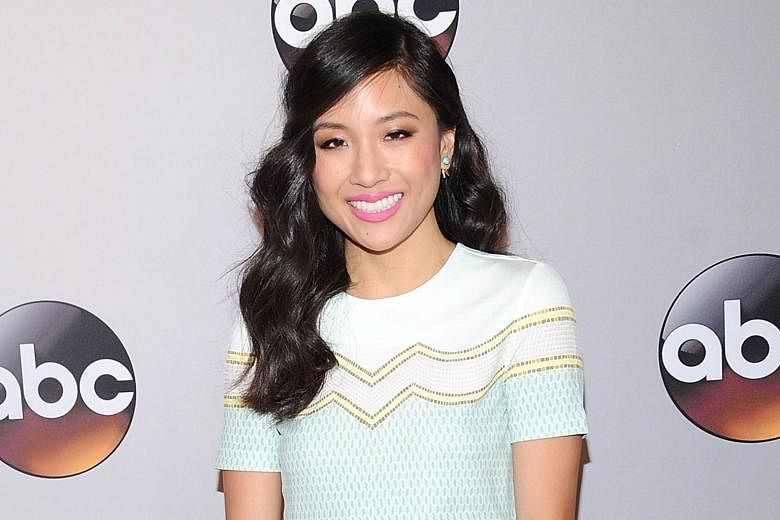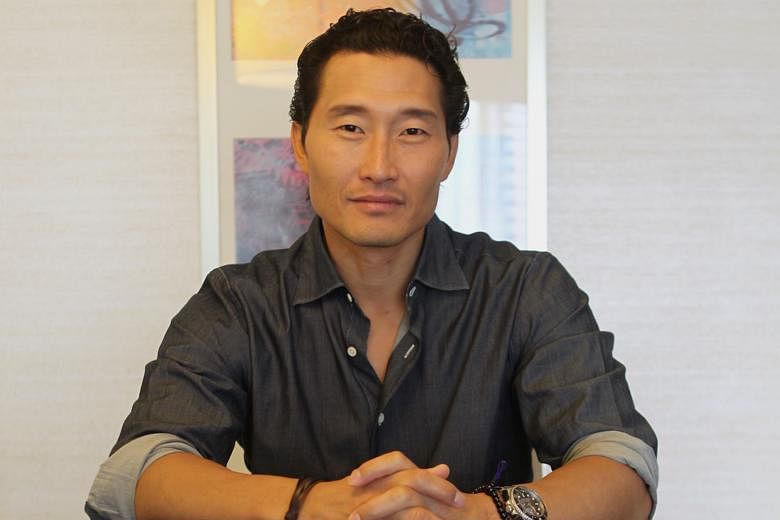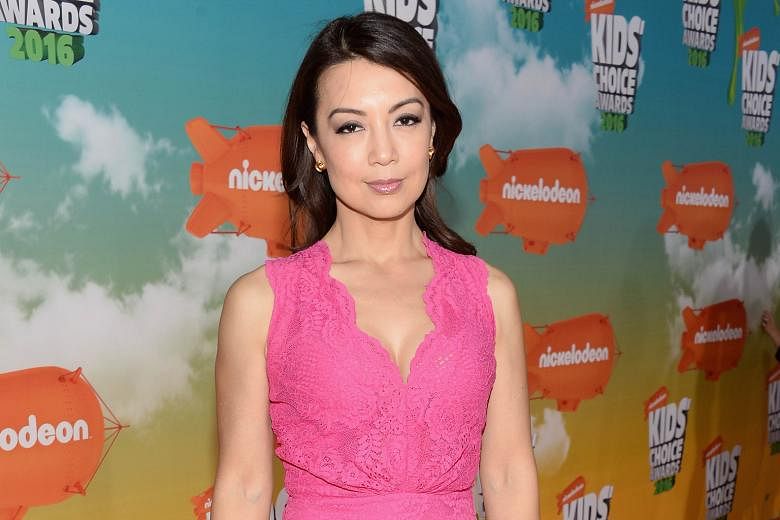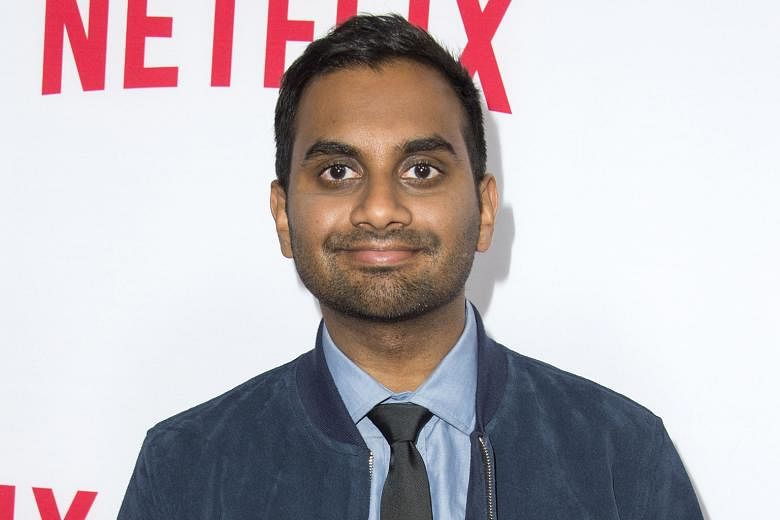NEW YORK • When Constance Wu landed the part of Jessica Huang, the Chinese-American matriarch on the ABC sitcom Fresh Off The Boat, she kept hearing the same dismal fact: It had been 20 years since a show featuring a predominantly Asian-American cast had aired on TV.
ABC's previous offering, the 1994 Margaret Cho vehicle All-American Girl, was cancelled after one season.
"I wasn't really conscious of it until I booked the role," Wu said. "I was focused on the task at hand, which was paying my rent."
The show, which was just renewed for a third season, has granted her a steady job and a new perspective.
"It changed me," she said.
After doing a lot of research, she shifted her focus "from self-interest to Asian-American interests".
In the past year, she and a number of other Asian-American actors have emerged as fierce advocates for their own visibility - and frank critics of their industry. The issue has crystallised in a word - "whitewashing" - that calls out Hollywood for taking Asian roles and stories and filling them with white actors.
On Facebook, Wu ticked off a list of recent films guilty of the practice and said: "I could go on and that's a crying shame, y'all."
It has never been easy for an Asian-American actor to get work in Hollywood, let alone take a stand against the people who run the place. But the recent expansion of Asian-American roles on television has paradoxically ushered in a new generation of actors with just enough star power and job security to speak more freely about Hollywood's larger failures.
And their heightened profile, along with an imaginative, on-the- ground social media army, has managed to push the issue of Asian- American representation - long relegated to the back burner - into the current heated debate about Hollywood's monotone vision of the world.
"The harsh reality of being an actor is that it's hard to make a living and that puts actors of colour in a very difficult position," said Daniel Dae Kim, who stars in Hawaii Five-0 on CBS and is appearing in The King And I on Broadway.
He has wielded his Twitter account to point to dire statistics and boost Asian-American creators.
Other actors lending their voices include Kumail Nanjiani of Silicon Valley, Ming-Na Wen of Agents Of S.H.I.E.L.D. and Aziz Ansari, who in his show, Master Of None, plays an Indian-American actor trying to make his mark.
They join long-time actors and activists such as BD Wong of Gotham; Cho, who has taken her tart comedic commentary to Twitter; and George Takei, who has leveraged his Star Trek fame into a social media juggernaut.
"There's an age-old stereotypical notion that Asian-American people don't speak up," Wong said. But "we're really getting into people's faces about it".
This past year has proved to be a particularly fraught period for Asian-American representation in movies. Last May, Sony released Aloha, a film set in Hawaii that was packed with white actors, including the green-eyed, blonde-haired Emma Stone as a quarter-Chinese, quarter-native Hawaiian fighter pilot named Allison Ng.
In September, it was revealed that in the planned adaptation of the Japanese manga series Death Note, the hero, a boy with dark powers named Light Yagami, would be renamed Light and be played by the white actor Nat Wolff.
Last month, Marvel Studios released a trailer for Doctor Strange, in which a character that had originated in comic books as a Tibetan monk was reimagined as a Celtic mystic played by Tilda Swinton.
And in the live-action United States film adaptation of the manga series Ghost In The Shell, scheduled for next year, the lead character, Major Motoko Kusanagi, will be called Major and played by Scarlett Johansson in a black bob.
Studios say that their films are diverse. "Like other Marvel films, several characters in Doctor Strange are significant departures from the source material, not limited by race, gender or ethnicity," Marvel Studios president Kevin Feige said in a statement.
Swinton will play a character that was originally male and Chiwetel Ejiofor, a character that was originally white.
Paramount and DreamWorks, the studios behind Ghost In The Shell, said that the film reflects "a diverse array of cultures and countries".
But many Asian-American actors are not convinced.
"It's all so plainly outlandish," Takei said. "It's getting to the point where it's almost laughable."
Meanwhile, Asian-Americans are increasingly playing leads and love interests and starring in multiple family sitcoms on TV.
Following Fresh Off The Boat, ABC debuted sitcom Dr Ken, featuring an Asian-American family led by the show's creator Ken Jeong, plus the drama Quantico starring Bollywood actress Priyanka Chopra.
On CW's Crazy Ex-Girlfriend, Rachel Bloom, as the title character, pines after the hunky Vincent Rodriguez III, who is Filipino-American. They join such mould-breakers as Mindy Kaling, creator and star of The Mindy Project, and Lucy Liu, who plays a reimagined Dr Watson in Elementary.
In films, a few roles have transcended stereotypes: Takei in the first Star Trek instalments, Liu in the Charlie's Angels features, and John Cho and Kal Penn in the stoner hit Harold & Kumar Go To White Castle (2004) and its sequels.
And more are in development: A film adaptation of Kevin Kwan's novel Crazy Rich Asians is underway and the Vietnamese-American actress Kelly Marie Tran will play a major role in the next Star Wars instalment.
But mostly, Asian-Americans are invisible. Though they make up 5.4 per cent of the US population, more than half of film, television and streaming properties feature zero named or speaking Asian characters, a February report from the Annenberg School for Communication and Journalism at the University of Southern California found. Only 1.4 per cent of lead characters in a sample of studio films released in 2014 were Asian.
For Asian-American actors, the dearth of opportunities compounds itself.
"An Asian person who is competing against white people, for an audience of white people, has to train for that opportunity like it's the Olympics," Wu said.
"An incredibly talented Asian actor might be considered for a leading role maybe once or twice in a lifetime. That's a highly pressured situation."
So some are stepping behind the camera. In addition to actors creating their own shows, like Kaling, Jeong and Ansari, Kim of Hawaii Five-0 has started his own production company, 3AD, "to help tell the stories of the under-represented", he said. Asian-American and other minority actors, he added, are "tired of waiting to be hired for the roles Hollywood creates for us".
And the Internet has allowed people to imagine a parallel universe where Asian-Americans dominate the screen.
Earlier this month, disappointed fans of the Ghost In The Shell franchise took a publicity still of Johansson in the lead role and edited the photo to insert the face of Rinko Kikuchi, the Japanese star of Pacific Rim.
Recently the hashtag #Starring JohnCho went viral, reimagining the Korean-American star as the lead of rom-coms and action flicks.
"As I was photoshopping John Cho's face on top of Tom Cruise's in the Mission Impossible poster, my friends and I started chuckling a little bit, like, 'How crazy would that be?'" said William Yu, the 25-year-old who created the hashtag. "Then I caught myself. Why should it be crazy?"
NEW YORK TIMES




